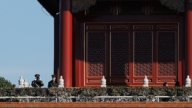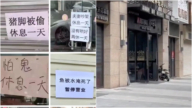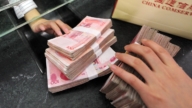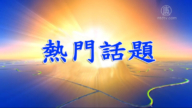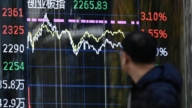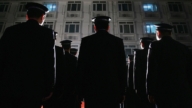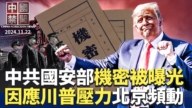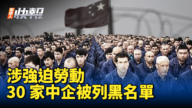【新唐人2012年6月21日訊】長期深居簡出的前中共人大委員長喬石,最近推出新書《論民主與法制》,20號在北京人民大會堂舉辦發佈會,隨後在全國範圍內發行。新書內容大部分屬於第一次公開發表。在中共十八大來臨之前,對於喬石重出江湖,高調論民主與法制,海內外人士各有不同的說法。下面一起去聽一聽他們的分析。
6月20號,喬石推出的新書——《論民主與法制》,在北京人民大會堂舉辦發佈會。官方媒體也為喬石的新書進行了報導。
這本書收錄了喬石從1985年至1998年擔任中共領導人期間,有關民主與法制的重要講話,全書分上、下兩集,共102篇,約44萬字,書中絕大部分是第一次公開發表。
針對喬石的《論民主與法制》,浙江前《海洋報》記者昝愛宗表示,在中共體制內,中國根本沒有新聞自由,司法也不獨立,更沒有人民選舉,所以談不上民主和法制。昝愛宗認為,喬石可能是想把他自己以前在職時的一些東西推出來,留作紀念,也是給他後代留下一點遺產。
昝愛宗:「中國是一黨專政的國家,它不存在民主。因為民主要有選票的,要有司法,立法要獨立的,行政要獨立的,要有選票來選舉領導人,如果沒有選票就沒有民主,所以它是空的。對於法制,它也不是真正的法制,它是統治者的工具。」
大陸民主人士恩廣表示,作為中共體制內退下來的人,他們在中共體制內的這種民主與法制論調,相對能贏得民眾的一點掌聲,但實際對中國走向民主起不到多大作用。
恩廣:「就是在同一體制內的情況下,他們只是相對的一種點化,也就是相對的論調一下,真正的能不能做到,以及他們又想做到甚麼程度,他們自己也不一定完全有底。」
不過,恩廣分析,這種民主與法制的論調,不排除是喬石個人的意願,希望能對中國未來的政治格局產生一點影響。
喬石在十三、十四兩屆政治局常委中,是僅次於趙紫陽、李鵬和江澤民的第3號人物,由於他曾經擔任中央辦公廳主任、中組部長、中央政法委書記等多項要職,一直被視為中共的實權人物。而在1997年中共的十五大上,喬石退出政治局常委,翌年卸任全部黨、政職務。喬石為甚麼會從政治局常委的位子上退下來,外界眾說紛紜。有傳言說,喬石是遭江澤民設計而退出政治局,因此民間有「江落石出」的傳聞。
據了解,退休後的喬石長住浙江杭州,極少公開露面,即使中共建國60週年、建黨90週年、北京奧運等大型活動,都不見喬石的身影。
然而,薄熙來事件爆發後,有消息說,在支持胡錦濤拿下血債派繼承人薄熙來等一些重大問題上,都有喬石在暗中發力。
而當江澤民開始鎮壓法輪功之前,喬石曾經代表老幹部向中共中央遞交了調查報告,報告論述「法輪功於國於民有百利而無一害」。然而,喬石卻遭到江澤民的誣指,指稱他是法輪功「4.25和平請願」的「幕後高手。」
時事評論員藍述:「 喬石在退休了這麼長時間以後,突然之間又高調的復出,那麼毫無疑問,有一條是他說明了,江澤民從1999年開始,一手主導的對法輪功的鎮壓,難以維計,繼續不下去了。同時,也說明這個中共內部,有一派人認識到對鎮壓法輪功,它所引起的中國社會的一個非常的不和諧。」
藍述表示,江派勢力,已經日落西山,在過去十幾年裡,由於鎮壓法輪功,牽扯了巨大的人力、物力,損害了上億民眾的信仰和家庭。藍述指出,中共給中國帶來的這場民族性災難,已經到了該結束的時候了。
採訪編輯/唐睿 後製/朱娣
Qiao Shi’s New Book Advocating Democracy
Qiao Shi, ex-chairman of the National People’s Congress
Standing Committee of the Chinese Communist Party (CCP),
rarely showed his face in public since his retirement in 1998.
On Wednesday, his new book “On Democracy and Rule
of Law" was released in a high profile fashion in Beijing.
The book will be published nationwide,
with most contents being unveiled for the first time.
Qiao’s rise to further prominence ahead of the CCP’s 18th
Congress, with his openly advocating democracy and rule of law,
has aroused different public opinions and speculation
in China and overseas.
On June 20 at the Great Hall of the People in Beijing,
Qiao Shi launched his new book,
“On Democracy and Rule of Law."
The CCP official media also reported on this new book.
The book contains Qiao’s important speeches on democracy
and the rule of law that were made over the course of 1985-1998, when Qiao held senior positions in the CCP.
Consisting of two parts, the volume has 102 articles in total,
about 440,000 words.
Most of its contents are being published for the first time.
Zan Aizong, former journalist of Zhejiang-based Ocean News,
comments on Qiao Shi’s new book.
“China has no freedom of press under the rule of the CCP,
nor an independent judiciary and general election, let alone democracy and the rule of law," says Zan.
The book might be intended to be a souvenir of Qiao Shi’s
work performance, and a small legacy for his offspring, Zan figures.
Zan Aizong: “China is a one-party state without democracy.
Democracy means voting, having an independent judiciary,
legislative and administrative power.
Without voting there would be no democracy. The CCP’s
legal system isn’t in its real sense, but a tool serving the rulers."
Chinese pro-democracy activist, En Guang, says that
retired CCP officials’advocacy for democracy and
rule of law might win applause from the public.
But in reality, it cannot play a significant role in China’s
democratic development, En Guang thinks.
En Guang: “They still stay within the CCP system, just
speak out or advocate (for ideals).
Can they really carry out their claims, and to what extent?
They themselves might not have greater assurance."
En Guang analyzes that Qiao Shi’s talk on democracy
and rule of law does not exclude his personal wishes.
That is, Qiao hopes his views may have some implications
for China’s future politics.
In the 13th and 14th generation of the CCP’s politburo’s
standing committee,
Qiao Shi was ranked No. 3 in leadership,
only second to Zhao Ziyang, Li Peng and Jiang Zemin.
Qiao once served as General Office director of the CCP’s
Central Committee, head of the Organization Department of the Central Committee,
secretary of the Central Political and Legal Affairs Committee, among others.
Qiao has long been deemed as a figure with real power
in the CCP.
In 1997 at the 15th Party Congress, Qiao Shi stepped down
from his seat in the politburo standing committee, and retired from politics the next year.
Opinion varied on the reason behind Qiao’s leaving
the politburo standing committee.
Rumors said that Qiao Shi fell into the clutches
of Jiang Zemin.
“As Jiang sinks Qiao Shi surfaces" was once a saying,
considered hearsay, that circulated in China’s civil society.
After retirement, Qiao Shi has lived in Hangzhou, Zhejiang,
with very few public appearances.
Qiao did not show up even on the CCP’s 60th anniversary
of P.R.China’s founding, the 90th anniversary of its Party founding, and at the 2008 Olympic Games.
However, sources say that after Bo Xilai’s case was exposed,
Qiao Shi played key roles behind Hu Jintao’s removing Bo
and in other major political issues.
Before Jiang Zemin started the persecution of Falun Gong,
Qiao Shi, representing the CCP’s senior veteran cadres,
submitted a survey report to the CCP Central Committee.
The report concluded, “Falun Gong has no harm
but only benefits for the country and the people."
Yet Jiang Zemin suspected Qiao Shi could be
the mastermind behind the scenes of
the “4.25 peaceful petition" staged
by Falun Gong practitioners in 1999.
Lan Shu (Critic): “Qiao Shi retired so long ago, now he
suddenly rose to prominence again, which, no doubt,
indicates that the persecution dominated by Jiang Zemin
against Falun Gong since 1999 is hard to sustain now.
it also shows that an internal CCP faction has realized that
the persecution against Falun Gong has created great social disorder in China."
Lan Shu notes that Jiang’s clique has been on the wane.
In the past 10+ years, the CCP’s persecution of Falun Gong
has exhausted huge manpower and material resources,
causing harms to hundreds of millions of people, their faiths
and families.
Now it is time to end the disaster that the CCP has brought
to the whole Chinese nation, Lan Shu remarks.


